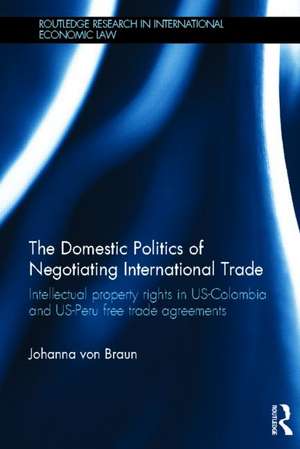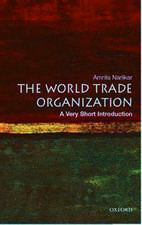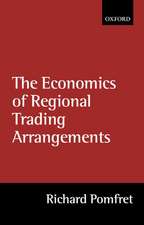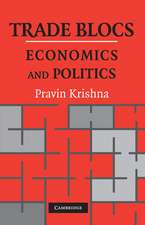The Domestic Politics of Negotiating International Trade: Intellectual Property Rights in US-Colombia and US-Peru Free Trade Agreements: Routledge Research in International Economic Law
Autor Johanna von Braunen Limba Engleză Hardback – 14 dec 2011
The book looks in detail at the intellectual property negotiations which formed part of the US-Peru and US-Colombia Free Trade Agreements and analyses the extent to which public health authorities and other parties affected by the increased levels of intellectual property protection were integrated into the negotiation process. The book then juxtaposes these findings with an analysis of the domestic origins of US negotiation objectives in the field of intellectual property, paying particular attention to the role of the private sector in the development of these objectives. Based on a substantial amount of empirical research, including approximately 100 interviews with negotiators, capital based policy-makers, private sector representatives, and civil society organisations in Lima, Bogotá and Washington, DC, this book offers a rare account of different stakeholders’ perceptions of the FTA negotiation process. Ultimately, the book succeeds in integrating the study of domestic politics with that of international negotiations.
This book will be of particular interest to academics as well as practitioners and students in the fields of international law, economic law, intellectual property, political economy, international relations, comparative politics and government.
Din seria Routledge Research in International Economic Law
-
 Preț: 278.61 lei
Preț: 278.61 lei -
 Preț: 355.32 lei
Preț: 355.32 lei -
 Preț: 343.00 lei
Preț: 343.00 lei -
 Preț: 309.79 lei
Preț: 309.79 lei -
 Preț: 410.07 lei
Preț: 410.07 lei -
 Preț: 389.38 lei
Preț: 389.38 lei - 18%
 Preț: 272.50 lei
Preț: 272.50 lei - 12%
 Preț: 313.61 lei
Preț: 313.61 lei - 18%
 Preț: 1010.26 lei
Preț: 1010.26 lei - 14%
 Preț: 337.84 lei
Preț: 337.84 lei -
 Preț: 469.38 lei
Preț: 469.38 lei -
 Preț: 388.72 lei
Preț: 388.72 lei -
 Preț: 416.05 lei
Preț: 416.05 lei - 18%
 Preț: 1000.27 lei
Preț: 1000.27 lei - 13%
 Preț: 297.15 lei
Preț: 297.15 lei -
 Preț: 467.44 lei
Preț: 467.44 lei -
 Preț: 416.22 lei
Preț: 416.22 lei -
 Preț: 487.62 lei
Preț: 487.62 lei -
 Preț: 286.43 lei
Preț: 286.43 lei - 17%
 Preț: 259.98 lei
Preț: 259.98 lei - 31%
 Preț: 763.97 lei
Preț: 763.97 lei - 18%
 Preț: 1057.89 lei
Preț: 1057.89 lei - 18%
 Preț: 840.56 lei
Preț: 840.56 lei -
 Preț: 476.08 lei
Preț: 476.08 lei - 18%
 Preț: 1001.07 lei
Preț: 1001.07 lei -
 Preț: 453.88 lei
Preț: 453.88 lei - 9%
 Preț: 1005.14 lei
Preț: 1005.14 lei -
 Preț: 412.95 lei
Preț: 412.95 lei - 18%
 Preț: 1000.27 lei
Preț: 1000.27 lei - 18%
 Preț: 1060.52 lei
Preț: 1060.52 lei - 18%
 Preț: 1061.69 lei
Preț: 1061.69 lei
Preț: 545.58 lei
Preț vechi: 728.31 lei
-25% Nou
Puncte Express: 818
Preț estimativ în valută:
104.41€ • 113.37$ • 87.70£
104.41€ • 113.37$ • 87.70£
Carte tipărită la comandă
Livrare economică 22 aprilie-06 mai
Preluare comenzi: 021 569.72.76
Specificații
ISBN-13: 9780415601399
ISBN-10: 0415601398
Pagini: 280
Ilustrații: 10 b/w images
Dimensiuni: 156 x 234 x 21 mm
Greutate: 0.68 kg
Ediția:1
Editura: Taylor & Francis
Colecția Routledge
Seria Routledge Research in International Economic Law
Locul publicării:Oxford, United Kingdom
ISBN-10: 0415601398
Pagini: 280
Ilustrații: 10 b/w images
Dimensiuni: 156 x 234 x 21 mm
Greutate: 0.68 kg
Ediția:1
Editura: Taylor & Francis
Colecția Routledge
Seria Routledge Research in International Economic Law
Locul publicării:Oxford, United Kingdom
Public țintă
Postgraduate and UndergraduateCuprins
1. Economic Diplomacy on Multiple Levels 2. Integrating IPRs into the International Trading System 3. Negotiating IPRs: A Defensive Position of Developing Countries and the New Challenges Posed by FTAs 4. The Domestic Source of Peru’s and Colombia’s Engagement in the FTA Negotiations 5. The US-Peru and US-Colombia FTA Negotiations 6. The Domestic Framework of US Economic Diplomacy 7. The Impact of US Domestic Policy Change on the Integration of IPRs/Health Concerns into the US-Peru and US-Colombia FTAs 8. Conclusion
Descriere
Looking in detail at US-Peru and US-Colombia FTA negotiations and more specifically at the issues surrounding intellectual property rights, this book seeks to demonstrate the importance of domestic politics in understanding the nature and outcome of international negotiations, in particular as they relate to international economic diplomacy. The book draws on a substantial amount of empirical research including interviews with individuals in Peru, Colombia and the US who were directly or indirectly involved in the negotiation process, focusing on the conflict between giving way to the pressure from the USA to increase intellectual property rights on the one hand, and maintaining public health safeguards on the other. The book demonstrates how the respective structural and institutional characteristics in Peru, Columbia and the USA affected the process and outcome of the respective FTA negotiations, exploring issues such as domestic policy-structures, the centrality of government and the influence of interest groups and industry’s lobbying. The book goes on to consider whether including public policy objectives in bilateral trade negotiations can ever be successful given the economic imperatives that provide the basis of such negotiations, or whether such objectives should instead be pursued through multilateral fora such as the World Health Organization.















